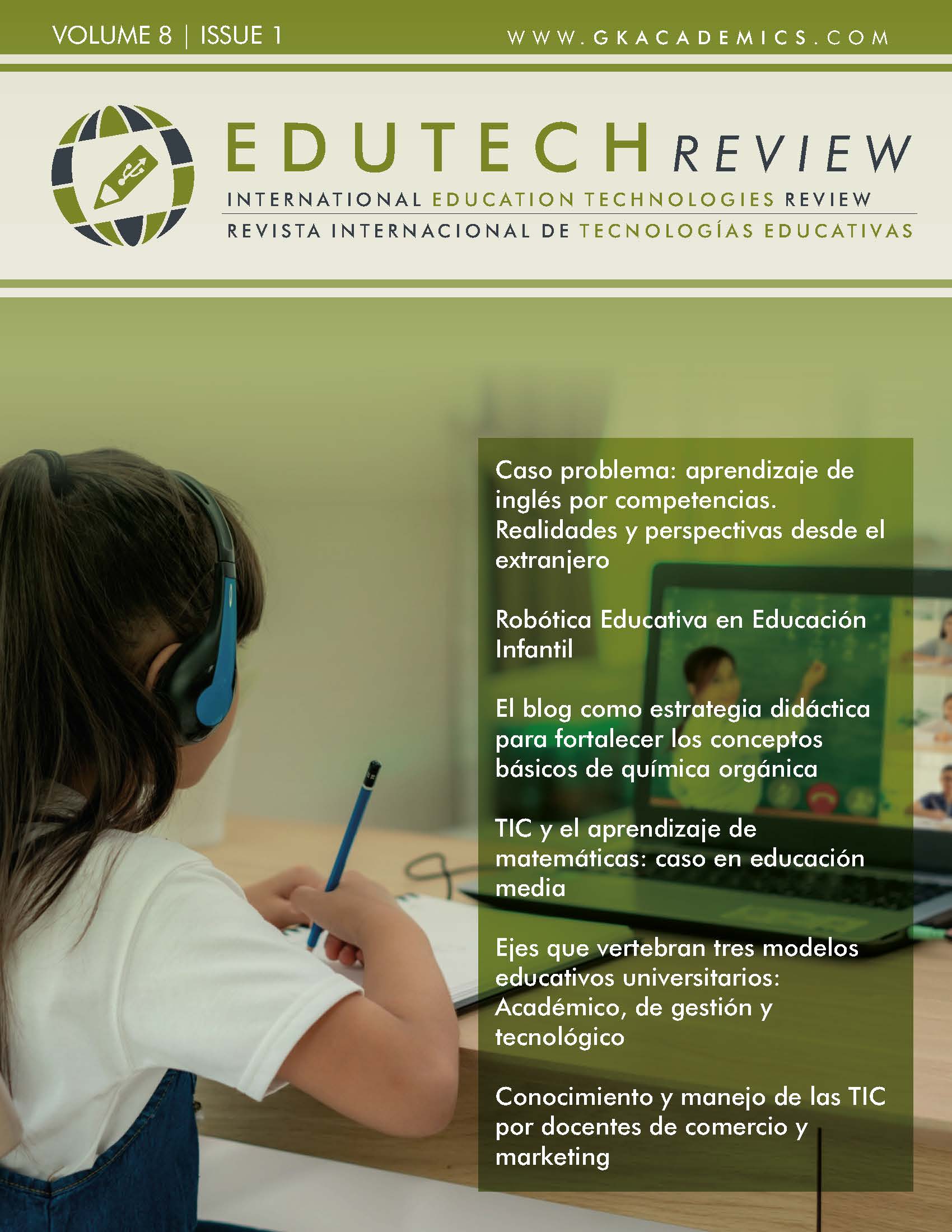Knowledge and management of ICT by teachers in Trade and Marketing
Changes produced by the Covid-19 pandemic and in the Information Era
DOI:
https://doi.org/10.37467/gka-revedutech.v8.2947Keywords:
Professional Training, ICT, Trade and Marketing, Social Networks, COVID-19, Tools, Innovate experiencesAbstract
Due to the pandemic of COVID-19 and the state of alarm it brought with it, there were lots of teachers who had to adapt themselves and to a new learning situation, facing the demands of Education 2.0 in a brief period. The lack of training and adjustment to the specific needs of teachers entails that many times, these professionals have to acquire knowledge on their own. In the field of Professional Training in Trade and Marketing, we find ourselves in a context where lots of teachers hardly have the knowledge of ICT.
Global Statistics ℹ️
|
537
Views
|
269
Downloads
|
|
806
Total
|
|
References
Armayones Ruiz, M. (21 de enero 2021). Redes Sociales: como consiguen que las utilicemos continuamente. Recuperado de: https://www.uoc.edu/portal/es/news/actualitat/2021/015-redes-sociales-uso-continuo.html
Buxarrais, M. R. (2016). Redes sociales y educación. Education in the Knowledge Society, 17(2),15-20. Recuperado de: https://www.redalyc.org/articulo.oa?id=5355/535554762002 DOI: https://doi.org/10.14201/eks20161721520
Calvo, S. T., Cervi, L., Tusa, F. y Parola, A. (2020). Educación en tiempos de pandemia: reflexiones de alumnos y profesores sobre la enseñanza virtual universitaria en España, Italia y Ecuador. Revista Latina de Comunicación Social, 78, 1-21. DOI: https://doi.org/10.4185/RLCS-2020-1466
Fundación Bankia por la Formación dual. Dualiza. (2020) Observatorio de la Formación Profesional en España Informe anual. Recuperado el 4 de junio de 2021 de: https://www.researchgate.net/profile/Juan-Gamboa-2/publication/347985099_Observatorio_de_la_Formacion_Profesional_en_Espana_Informe_2020/links/5feb71f1a6fdccdcb8167d62/Observatorio-de-la-Formacion-Profesional-en-Espana-Informe-2020.pdf
Garrote Rojas, D., Jiménez-Fernández, S. y Serna Rodríguez, R. (2018). Gestión del tiempo y uso de las TIC en estudiantes universitarios. Píxel-Bit, 53, 109-121. https://doi.org/10.12795/pixelbit.2018.i53.07 DOI: https://doi.org/10.12795/pixelbit.2018.i53.07
Grande-de-Prado, M., García-Peñalvo, F. J., Corell, A. y Abella-García, V. (2021). Evaluación en Educación Superior durante la pandemia de la COVID-19. Campus Virtuales, 10(1), 49-58. DOI: https://doi.org/10.37117/s.v19i1.405
Jorge Vázquez, J., Nañez-Alonso, S.L., Sanz-Bas, D. y Chivite- Cebolla, Mª P. (2020). Contribuciones de la tecnología digital en el desarrollo educativo y social. Edit Adaya Press.
Marín Díaz, V. Cabrero Almenara, J. (2019). Monográfico Las redes sociales en educación: desde la innovación a la investigación educativa. Revista Iberoamericana de educación a distancia, 22(2).DOI: https://doi.org/10.5944/ried.22.2.24248 DOI: https://doi.org/10.5944/ried.22.2.24248
Observatorio Tecnológico (2012). Monográfico: Redes Sociales. Recuperado de: http://recursostic.educacion.es/observatorio/web/en/internet/web-20/1043-redes-sociales?start=3
Olmedo Torre, N. y Farrerons Vidal, O. (2017). Modelos constructivistas de aprendizaje en programas de formación. Cataluña. Universidad Politécnica de Cataluña. Recuperado de: https://upcommons.upc.edu/bitstream/handle/2117/112955/modelos_constructivistas.pdf;seque DOI: https://doi.org/10.3926/oms.367
Peña Martínez, E. y M. Esteve-Mon, F. (2017). Capítulo 3 Tag2learn: una herramienta para la integración de redes sociales y plataformas de teledocencia. En Zapata Boluda, R. (dir.) Educación, salud y TIC en contextos multiculturales: Nuevos espacios de intervención. Edit. Universidad de Almería
Ricardo Barreto, C. e Iriarte Diezgranados, F. (2017). Las TIC en educación superior: Experiencias de innovación. Universidad del Norte. DOI: https://doi.org/10.2307/j.ctt2050wh0
Downloads
Published
How to Cite
Issue
Section
License
Those authors who publish in this journal accept the following terms:
- Authors will keep the moral right of the work and they will transfer the commercial rights.
- After 1 year from publication, the work shall thereafter be open access online on our website, but will retain copyright.
- In the event that the authors wish to assign an Creative Commons (CC) license, they may request it by writing to publishing@eagora.org







